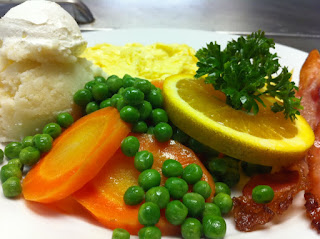Science was never confined just to labs.
We don't realise it, but we do play with science every day at work, play or home.
The understanding of science behind a recipe, procedure or ingredient is a key to a creation.
Right from adding salt into boiling water for eggs to using an egg in soups to clarify consommé.
Science of cooking is all chefs do to wow you every time.
Ever wondered why add oil while boiling a pasta?
Some applications are simple and some needs precision and instinct.
And most chefs work with these.
Of course these days we do have equipments and gadgets making kitchen life easier.
Yet, cooking is more about understanding the science than measurements.
Given an example
Consommé; the clear amber soup that you sip in wondering where all that flavour comes from.
Consommé is a type of clear soup made from a flavoured stock or bouillon that has been clarified by egg protein.
 |
| Shrimp Consomme |
It takes year of experience and understanding to master the art of consommé making.
A consommé is made by adding a mixture of ground meats, together with mirepoix, tomatoes, and egg whites into either bouillon or stock. The key to making a high quality consommé is simmering; the act of simmering, combined with frequent stirring, brings impurities to the surface of the liquid, which are further drawn out due to the presence of acid from the tomatoes. Eventually, the solids begin to congeal at the surface of the liquid, forming a 'raft', which is caused by the protein in the egg. Once the 'raft' begins to form, the heat is reduced, and the consommé is simmered at a lower heat until it reaches the desired flavor, which usually takes anywhere from 45 minutes to over an hour. The resulting concoction is a clear liquid that has either a rich amber colour or a very pale yellow colour. It is then carefully drawn from the pot and passed again through a filter to ensure its purity, and is then put through a lengthy process where all of the visible fat is skimmed from the surface.




























.JPG)

